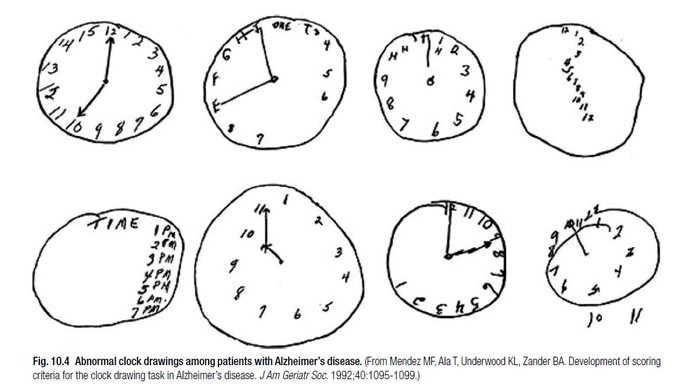The 30-second drawing test that could predict your dementia risk – how do you score?
You can find out if you have dementia risk by doing a QUICK drawing test.
The 30-second at-home test may help determine whether you should be concerned about your memory, even though it’s common to get forgetful as you age.
One fast method of determining a person’s risk of brain robbing disease is to have them attempt to sketch a clock from memory.
The test actually evaluates a variety of cognitive capabilities simultaneously, including memory, visual-spatial aptitude, understanding, motor skills, and focus, despite its seemingly straightforward appearance.
If a person develops dementia, the very skills required to pass the test may start to deteriorate.
A Mexican neurologist who studies cognitive decline, Dr. Jesus Ramirez-Bermudez, claims that the clock drawing test is a simple and reliable method of identifying dementia risk.
Read more on dementia
He said that “it remains one of the easiest and cheapest ways to identify patients” with neurological disorders like dementia after posting a picture of various clock paintings to X.
Early indications of the illness could include drawing an uneven circle or arranging the clock’s numerals wrongly.
However, according to the NHS, which has been using the screening approach for decades, if someone is able to draw a clock correctly, it “virtually excludes” dementia because the exercise involves a wide variety of cognitive functions.
Nearly a million Britons are said to suffer from the brain-robbing illness.
By 2040, that figure is expected to increase to 1.4 million.
About 60 to 70 percent of cases have Alzheimer’s disease, making it by far the most prevalent type.
The 14 science-backed ways to prevent dementia
It’s crucial to remember that the test is frequently used in conjunction with other screening techniques, so receiving a low score does not guarantee that you will get dementia.
However, it can act as a reminder to discuss your memory with your doctor.
According to the UK Dementia Directory, you should encourage family members who you believe may be experiencing memory loss to do the 30-second dementia test.
According to the report, the test “could help them realise they could have a problem” and motivate them to discuss their concerns with a general practitioner.
Symptoms of dementia
Symptoms of dementia can include issues with:
- Memory loss
- Thinking speed
- Mental sharpness and quickness
- Language, such as using words incorrectly, or trouble speaking
- Understanding
- Judgement
- Mood
- Movement
- Difficulties doing daily activities
Individuals suffering from dementia may become disinterested in their typical pursuits and struggle to control their emotions or behavior.
They might also lose interest in relationships and socializing, and they might find social situations challenging.
They might become less empathetic and exhibit other changes in their personality.
It can appear as though someone with dementia is lying or willfully ignoring issues because they may lose the ability to recall events or have a limited understanding of their surroundings or circumstances.
A person with dementia may have trouble organizing and planning because the disease impairs mental functions. Additionally, they could have trouble maintaining their independence.
Typically, a person suffering from dementia will require assistance from friends or family, including assistance with decision-making.
Source: NHS
The clock-drawing activity was listed as “probably the best and most widely used do at home dementia test” in the directory.
It went on to say: “GPs and dementia experts also frequently use the clock drawing test.
“They can be used to give a quick and simple early diagnosis that there could be a problem that warrants further investigation into the individuals memory.”
How to do the test
A blank sheet of paper and a drawing tool are all you’ll need.
Request that your loved one:
- Draw a clock
- Put all the numbers on the clock face
- Draw the hands onto the clock, giving them a set time to put in
The drawing has to be scored now.
To evaluate it, use the following criteria:
- How well the person drew the clock circle
- Have they included all the numbers 1-12?
- Are all the numbers drawn in the correct order on the clock face and in the correct place?
- Did they draw two hands on the clock?
- Do the hands on the clock say the correct time you asked them to draw?
Give each right response a point.
As stated in the Dementia Directory, “a normal score for the test is four or five points,”
“Anything less than four points should be a concern.”
If you are worried about the results, ask your loved one to see a general practitioner.
While there isn’t a cure for dementia at this time, medication can decrease the progression of the illness if it is identified early.
Additionally, the Dementia Directory suggests trying a basic word association test.
In one minute, ask the individual you are worried about to list every animal that comes to mind.
Read More on The US Sun
Asking them to name every fruit variety they can recall in a minute is another option.
“Research has found that a healthy individuals scoring should between 20 to 25 words in the time given, whereas a person who may have memory problems usually scores between 10 to 15,” the guide stated.
Note: Thank you for visiting our website! We strive to keep you informed with the latest updates based on expected timelines, although please note that we are not affiliated with any official bodies. Our team is committed to ensuring accuracy and transparency in our reporting, verifying all information before publication. We aim to bring you reliable news, and if you have any questions or concerns about our content, feel free to reach out to us via email. We appreciate your trust and support!














